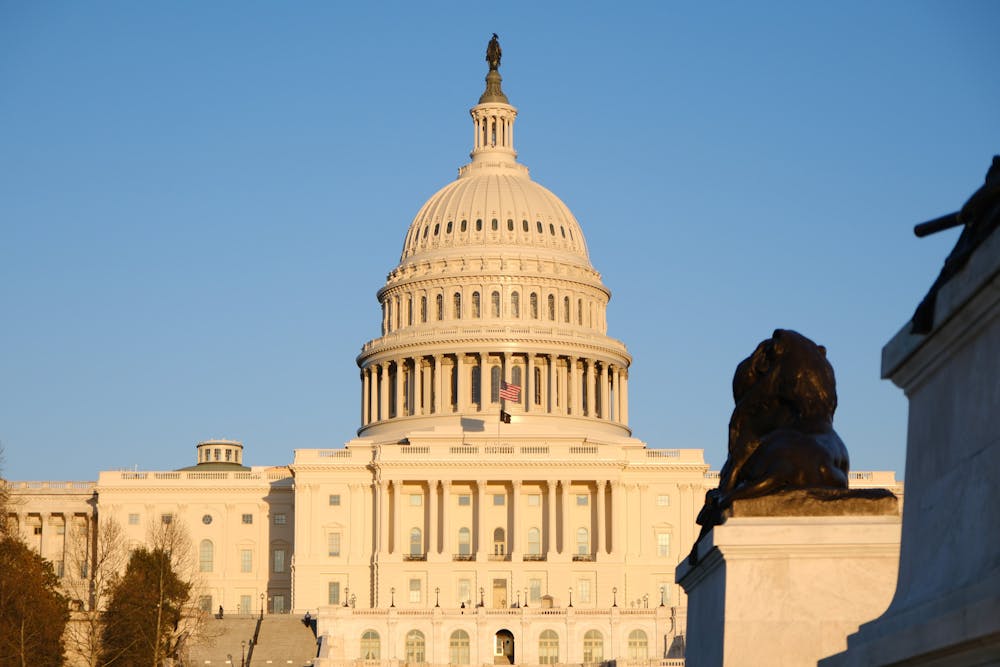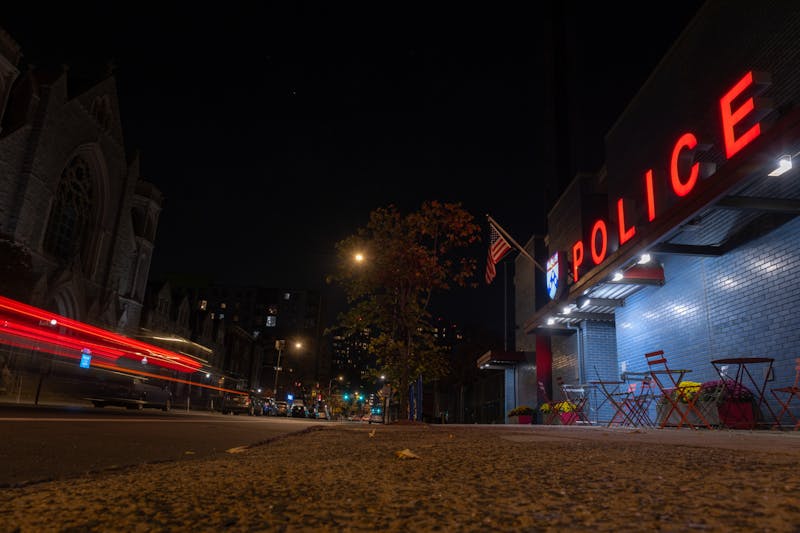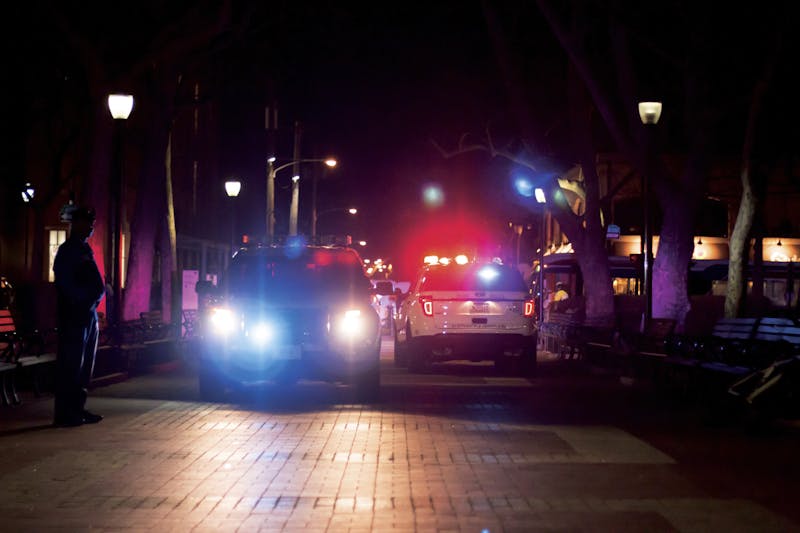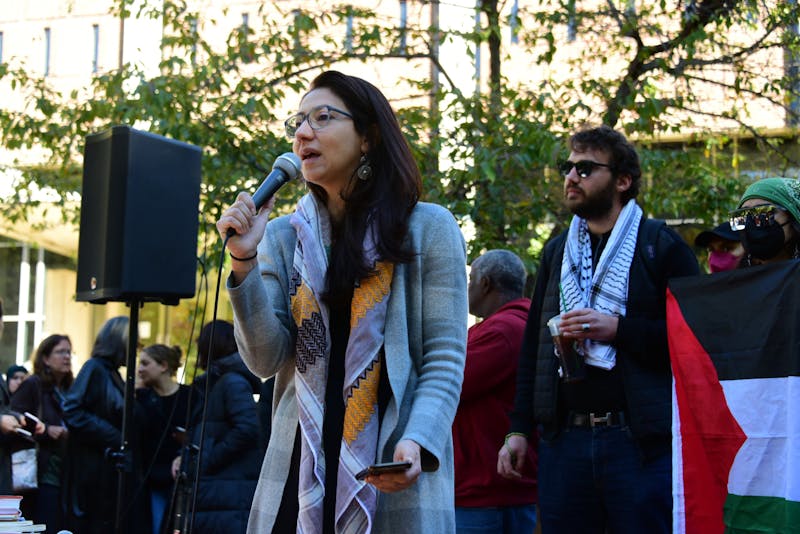
A congressional probe into campus antisemitism revealed the extent of Penn’s response over the past year to allegations of antisemitism on campus, calls for former Penn President Liz Magill’s resignation, and pro-Palestinian campus protests.
The 325-page report by the Republican-led United States House Committee on Education and the Workforce includes the committee’s findings from its yearlong investigation of several higher education institutions, including Penn — which found itself subject to national political scrutiny after Magill’s testimony before the U.S. Congress was widely condemned. The report confirms that Penn shared with the committee information about disciplinary proceedings against its students from throughout the 2023-24 academic year, along with several private exchanges between current and former high-level administrators about the scrutiny facing Magill throughout last fall.
"Penn, along with many facets of society, has faced numerous challenges over the last year, including the rise of antisemitism on campuses,” a University spokesperson wrote to The Daily Pennsylvanian. “Penn remains committed to ensuring that our missions of teaching and research excel, and that our students continue to learn in an environment that feels safe while also fostering curiosity, debate, and civil discourse as foundational values.”
The spokesperson also pointed to the University Task Force on Antisemitism and the Presidential Commission on Countering Hate and Building Community and the newly formed Office of Religious and Ethnic Inclusion.
In a statement to the DP, House Education and the Workforce Committee Chair and Rep. Virginia Foxx (R-N.C.), reiterated her belief that “universities can’t just change who’s in charge.”
"There has to be a concerted effort to destroy the moral rot that has infected many of these so-called elite institutions – Penn is a prime example,” she added. “It was not just President Magill, it was those around her that dismissed antisemitism as a PR crisis or political stunt and failed to institute meaningful discipline for the perpetrators, even for heinous misconduct including a riot at the President’s house, building occupations, and threats against Jewish students.”
A significant portion of the report focused on disciplinary actions taken against Penn community members for incidents throughout the fall 2023 and spring 2024 semesters.
The report included ten pages of disciplinary records labeled “STRICTLY CONFIDENTIAL – NOT FOR CIRCULATION/COMMITTEE MEMBERS AND STAFF ONLY.” The records included descriptions of fourteen unique incidents that occurred on Penn’s campus between September 2023 and May 2024, as well as each case’s status, “actions to date,” and outcome. Personal information about the students involved in each investigation was not included in the report and individuals were only identified by their school and current enrollment status.
When asked about the pages of the report labeled “strictly confidential,” AnnMarie Graham-Barnes, a spokesperson for the committee, confirmed that everything released in the report today was “done so intentionally and with notice to the parties involved.”
According to the committee’s report, three Penn students have been suspended for a single semester and 14 students have received semester-long disciplinary probations since Oct. 7, 2023. The report cited “multiple serious incidents on campus,” including the Gaza Solidarity Encampment, what it called a “riot” outside Interim Penn President Larry Jameson’s residence, and multiple “building occupations.”
The confidential records indicate that the Center for Community Standards and Accountability — which was listed as the reviewing entity for 13 of the 14 investigations — relied on sections of its Open Expression Guidelines and Code of Student Conduct to prosecute pro-Palestinian students and seek a wide range of punishments.
Of the 14 incidents, five cases involving a total of 31 students remain “open.”
The report indicated that none of the 16 students who participated in the November 2023 Freedom School for Palestine sit-in in Houston Hall received discipline despite “being repeatedly informed that their presence violated building policies and prevented other students from using the space.” The students were informed that the Vice Provost of University Life had “withdrawn the referral” from initial charge letters, according to the report.
It also discussed several incidents on Penn’s campus in the past year, including the Gaza Solidarity Encampment and ensuing arrests, a march and rally in front of Jameson’s house on May 10 shortly after the encampment was swept, and a May 17 attempted occupation of Fisher-Bennett Hall.
The report indicates that Penn investigated 21 students alleged to have participated in the encampment, nine of whom were arrested when it was swept on May 10. Of the nine students arrested, two — who both “were also found responsible” for the attempted Fisher-Bennett occupation — received one-semester suspensions, five received disciplinary probation, and two still have cases pending resolution.
Of the 12 investigated students not arrested, the report indicated that five received disciplinary probation, five were found not responsible, and two have ongoing disciplinary cases.
During the May 10 rally in front of Jameson’s house, at least four demonstrators entered the gates of the house — and the report confirmed that two students were investigated for their roles in this incident.
The committee wrote that protesters “broke open” the gate of the house, “disobeyed police instructions, and engaged in what police described as a ‘riot’ that caused approximately $18,000 of damage.”
During the rally, around eight protesters climbed the gates of Jameson's house and grabbed hold of the fence and gate surrounding the residence, which they shook until the lock opened, according to a statement at the time from Penn’s Division of Public Safety. The opening of the gate prompted several demonstrators to enter the yard and deploy smoke bombs, with one protester waving a Palestinian flag.
Of the seven Penn students who were arrested for their involvement in the attempted occupation of Fisher-Bennett Hall on May 17, the report says that three — including the two suspended for their role in the encampment — were suspended for one semester, two received disciplinary probation, and two are not enrolled while the resolution of their cases remains ongoing.
Other specific disciplinary cases mentioned in the report include ten “anti-Israel” students disrupting a Board of Trustees meeting and causing it to adjourn, resulting in two probations and eight reflective essay assignments.
The report describes two separate instances of theft of Israeli flags from private properties — one in October 2023 and another in November 2023. Both students received sanctions of “Suspension Not Imposed” — which the report called “paltry” — and the student who perpetrated the theft in October 2023 was also assigned a “reflective essay assignment.”
The report also alleges that University administrators attempted to coordinate positive press coverage and that campus leaders “turned their backs” on Jewish students — while calling for an investigation into universities’ compliance with the laws that allow them to receive federal funding.
Among its findings about Penn are excerpts from an email conversation between Magill and former University Board of Trustees Chair Scott Bok, in which the committee alleged that they “disparaged” calls for Magill’s resignation by former New Jersey Gov. Chris Christie.
“Christie called for you to be fired? That’s outrageous. He knows nothing about the situation,” Bok wrote in an email to Magill obtained by the Republican-led committee.
“Part of the political branch of this campaign,” Magill responded.
Bok replied, “And that group is so easily purchased,” according to a copy of the email listed in the report.
The committee report wrote that “[t]he exchange between Bok and Magill shows that they dismissed efforts to hold colleges accountable for their inability to get control of antisemitism on their campuses,” adding that language used by Bok “echoed longstanding antisemitic tropes about Jewish money and influence.”
In a statement to the DP, Bok wrote that he was “puzzled why this one email exchange was singled out from the 400,000 pages of documents the committee report says it reviewed.”
“I stand by my view that commentary from someone with no connection to Penn who was in the midst of running for public office was not going to be helpful to anyone at Penn,” Bok added, noting that he was “pleased so little” of the report was focused Penn.
A spokesperson for Magill wrote to the DP that she "took numerous steps to address campus antisemitism in the fall of 2023." The spokesperson cited Magill's launch of Penn's plan to combat antisemitism and of a Jewish student advisory group, increased security on campus, and "condemning antisemitic acts" and ensuing acts were "investigated and pursued by relevant authorities, including federal law enforcement."
The report also details allegations of antisemitism at other universities including Harvard University, the Massachusetts Institute of Technology, Columbia University, and Northwestern University — all institutions that have testified before the committee during the previous academic year.
The committee alleged that another conversation between a senior official in Penn's Office of the President and Anna Cowenhoven, the University’s former vice president for University Communications, show that the University “sought to generate media narratives portraying Members of Congress’ questioning of Magill as ‘bullying and grandstanding.’”
In the series of messages, the administrators discuss that Larry Platt of The Philadelphia Citizen would be willing to write about the hearing “if we want help,” and that the Citizen editor “thinks [it is] ridiculous.”
“If he could talk about bullying and grandstanding by members,” Cowenhoven responded.
The messages “make clear that they viewed the problem with the hearing was not Magill’s morally bankrupt testimony but rather that ‘bullying and grandstanding’ Members of Congress had dared to hold her accountable for her record,” the report reads.
Cowenhoven did not immediately respond to a request for comment.
In response to a request for comment, Platt told the DP that he doesn’t remember discussing Magill’s testimony with the Penn official named in the report, though he “doesn’t doubt it” since he speaks with her often as a “good friend.”
He also clarified that he “didn’t write anything covering that testimony at the time as might be implied by the messages quoted” in the report.
An article ran in the Citizen about the hearing on Dec. 8, 2023, but was written by Elaine Maimon and not Platt.
“For the record, I think President Magill’s testimony was lacking moral clarity, and that Rep. Stefanik’s questioning was scapegoating — both could be true — and wrote as much over a month later,” Platt said, referring to a Jan. 26 Citizen article titled “The War in University City.”
The Daily Pennsylvanian is an independent, student-run newspaper. Please consider making a donation to support the coverage that shapes the University. Your generosity ensures a future of strong journalism at Penn.
Donate











